How different one of Sydney’s greatest eras could have been. The Swans were set on Terry Wallace replacing Rodney Eade, then the ‘Choose Roos’ campaign made them think twice. But ultimately, as the premiership coach reveals on the SACKED podcast, it was a call from a journalist that convinced him he was a chance of becoming Sydney’s senior coach.
It was the phone call that kickstarted the Swans’ revival and ultimately helped to set the club on a pathway towards ending the longest premiership drought in VFL-AFL history.
If it hadn’t come, the history of the Sydney Swans Football Club might have been very different, according to Paul Roos, the man who held up the premiership cup alongside Barry Hall in 2005 after declaring ‘Here it is’ on the podium after the Swans’ first flag in 72 years.
It is hard to believe now, more than 20 years on, that Roos – the man credited with helping to forge the Bloods’ culture — wasn’t the natural choice as coach when Rodney Eade parted company with the club midway through a challenging 2002 season.
The Swans had a not-so-secret agreement with contracted Western Bulldogs coach Terry Wallace that he would take over as coach in 2003, despite the fact that Roos was trying his best to unite the team as Swans’ popular caretaker coach.
“I remember (former Swans player and respected member of the media) Neil Cordy rang me and said: ‘Roosy, when are you presenting to the board (for the coaching job)?” Roos said on the Herald Sun’s Sacked podcast.
“He said. “I said: ‘Mate, I’ve got no idea!’. He said: ‘I think you better ask’.”
PART 1: DID DEMETRIOU INSPIRE SWANS’ HISTORIC 2005 FLAG?
PART 2: THE BARRY HALL MOMENT ROOS REGRETS
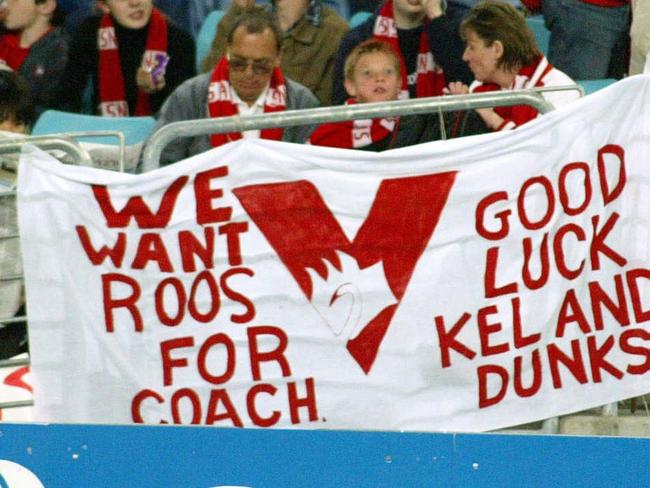
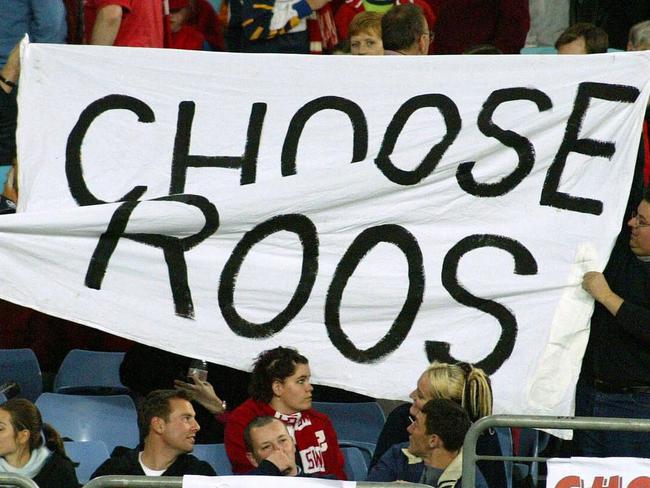
Roos immediately rang chief executive Andrew Ireland to ask for an interview.
He has a theory that the Swans board “were hoping I never presented … then they could have said ‘Well, we couldn’t give him the job because he never interviewed’.
Thankfully, Cords found out and I was able to put my presentation together.
He doesn’t hold grudges about what happened behind the scenes that almost certainly would have led to Wallace taking over, but for an on-field revival that saw the Swans win six of their last 10 games under Roos, and an off-field revolt to any suggestion that Wallace would beat him to the role.
The fans called it ‘Choose Roos’; the players got on board.
“It was tough for the club,” Roos said. “I think everyone’s happy with the way it turned out, including Terry who probably got a shit-load of money.
“Publicly, the club denied it (had an agreement with Wallace).
“When I’ve talked to (chairman) Richard Colless about it, I think it surprised the club how passionate the fans were.
“I think (some people) were thinking ‘We hope Roosy goes away’. I’ve always had a good relationship with Richard. He has said to me before that he really credits the galvanisation of the fans and the ‘Choose Roos’ (campaign) as a turning point for the club.”
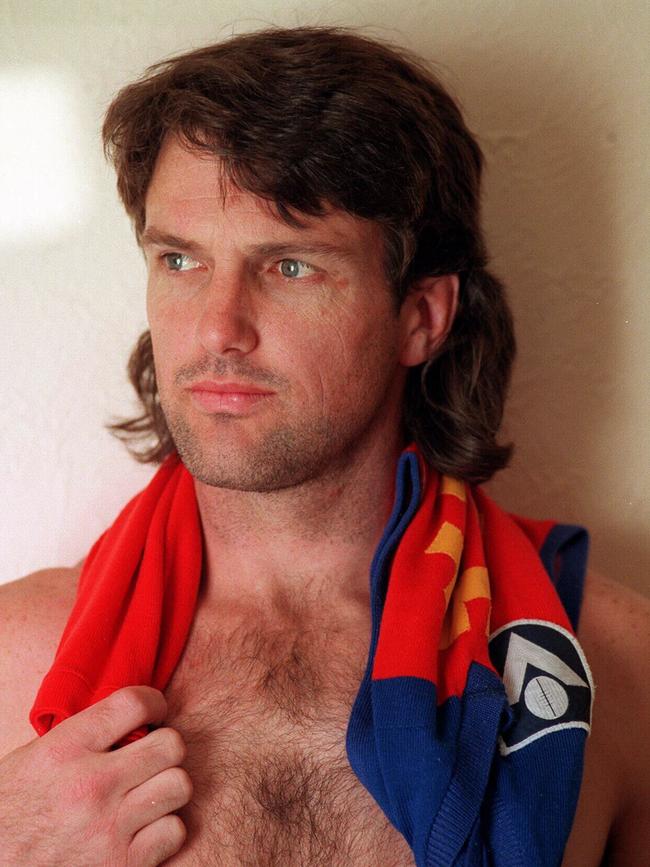
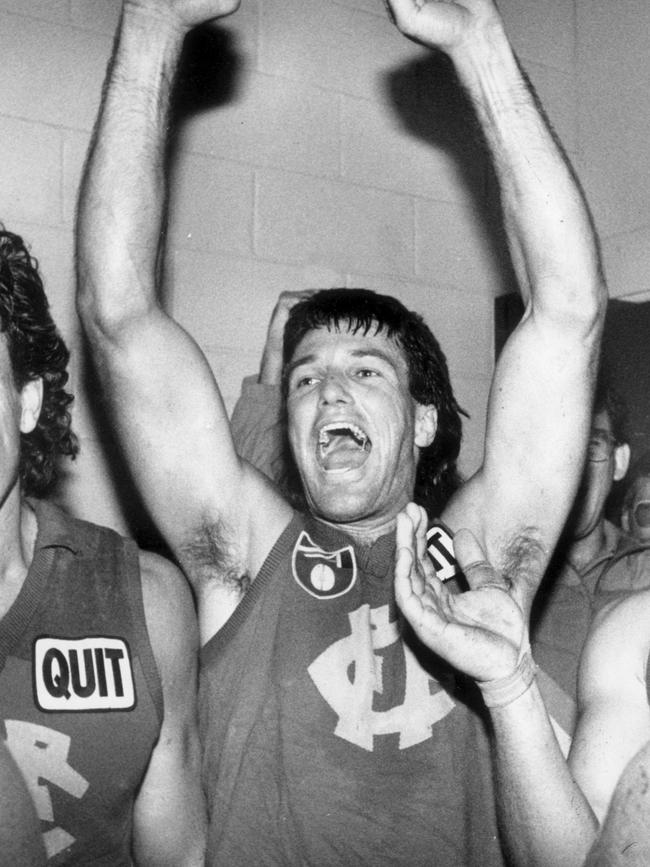
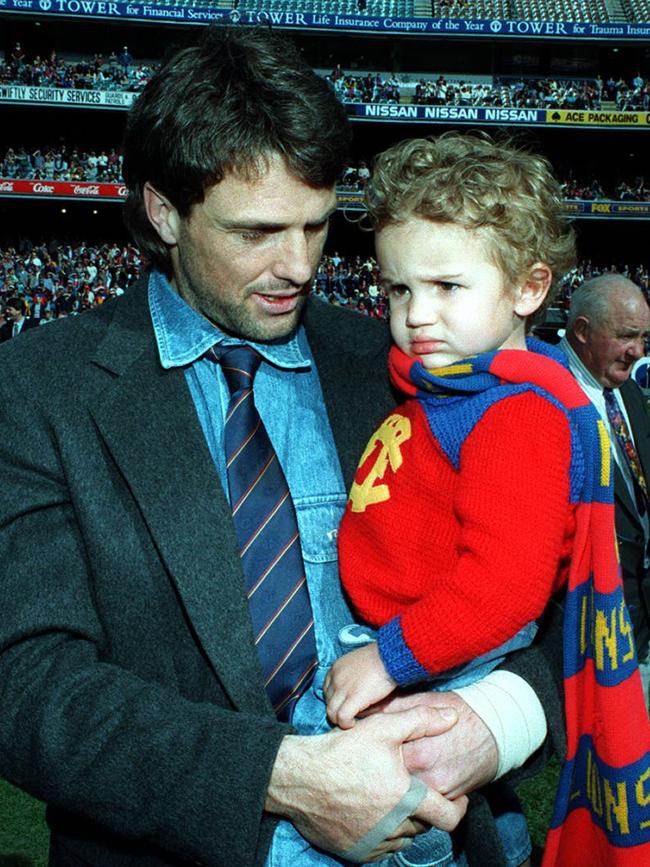
BECOMING THE LIONS’ NO. 1
The kid from Beverley Hills Football Club — in Melbourne’s eastern suburbs, not California — feared he had been dumped from Fitzroy even before his first game.
Roos was a 17-year-old when he and his parents, and his then girlfriend, were invited to his first senior jumper presentation in 1981.
“They were counting down the numbers, from 60 … all the way down to 30, 25 and further,” Roos recalled.
“There were stories at the time about guys turning up to the jumper (presentation) and getting delisted on the night because the chairman of the match committee forgot to call them.
“The numbers kept going down and I am sitting there going ‘wow, what is going on here.”
But just as the embarrassment was starting to kick in for him, Roos’ name was called out as No. 1, much to his shock, given he hadn’t played a game.
He made his debut the following season and within a few years he would be considered one of the competition’s best players, and the Lions’ No. 1 player of his era.
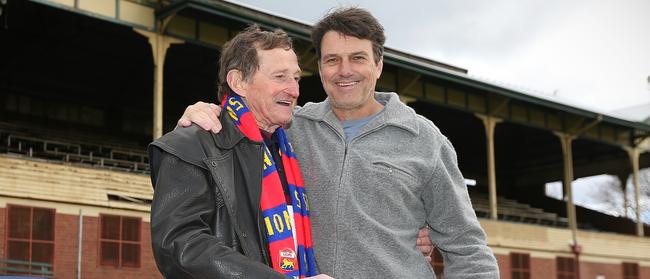
Roos promo 1
‘WE SHOULD HAVE MOVED TO BRISBANE IN ‘86’
Roos was a rusted-on believer in Fitzroy, despite endless financial challenges and merger talks that put the Lions on death row throughout his time there.
But he insisted the club missed a great opportunity to move to Brisbane in 1986 — the year he lost the Brownlow Medal by a vote — when all seemed lost.
“It was six or seven games to go … Leon Wiegard (Fitzroy president) said ‘Guys, we have got three options … we can fold, we can merge with a Melbourne-based club or we can go to Brisbane’,” Roos said of the discussion which took place on a Wesley College tennis court.
“We all voted to go to Brisbane, and myself, and Perty (Gary Pert), and a few others started meeting with Ronny Joseph, who was running one of the (Brisbane) syndicates.
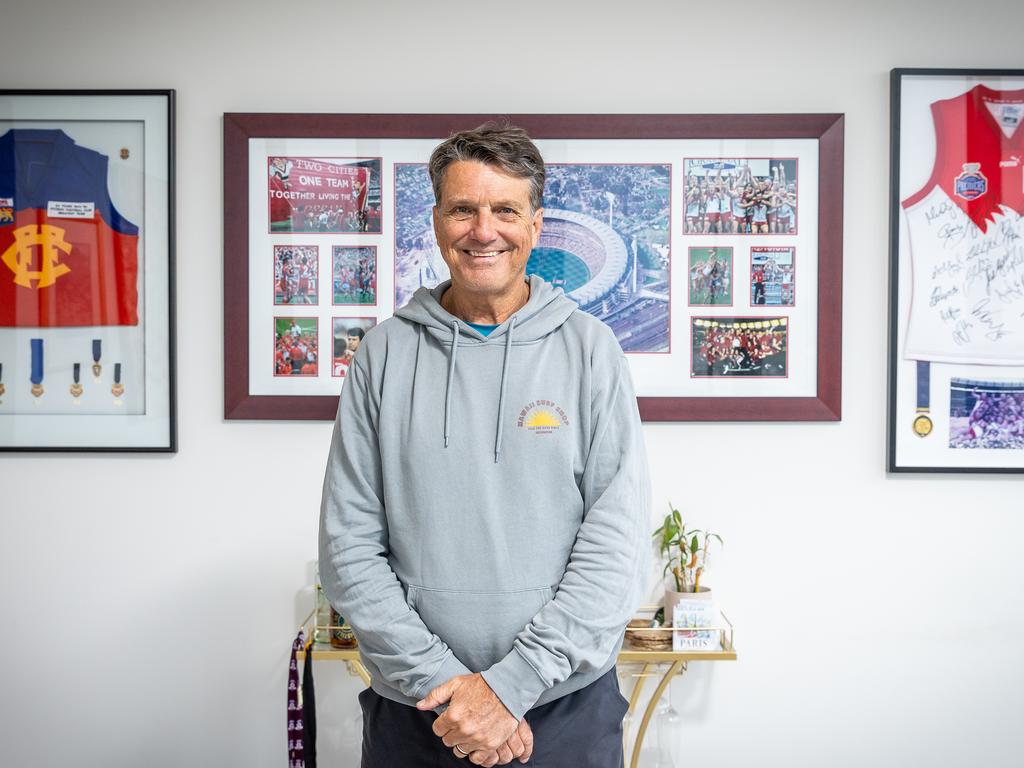
“But we won five out of our last six games, we got through to the preliminary final and that was probably the worst thing that happened … because (a building company) came in and saved us at the time. When I say the worst thing, well, I think they went broke not long after and (Fitzroy) really struggled to pay the players.
“If we had gone to Brisbane in ‘86, they had (drafted) the two Jarmans and Martin Leslie … in the end the Jarmans didn’t go. But I really believe it would have been a powerhouse football club from day one. We would have kept all the great players that eventually left.
It was a really big mistake in hindsight. I know why the Fitzroy faithful did what they did, and they all worked so hard, but it all fell apart after 1986.
BOYCOTT AND A FAKE B&F MEDAL
Within three years of that Brisbane missed opportunity, Fitzroy was seen as the dominant partner in an AFL-inspired merger with Footscray.
But just when the merger looked guaranteed, the Bulldogs members galvanised to stop it, while Fitzroy was left without a partner at the altar.
Around that time, Roos said some of his Fitzroy teammates came to him asking if their money was guaranteed if the club folded.
“We actually went to the AFL and asked them through my manager Damien Smith if they would guarantee our contracts,” Roos said. “They said they wouldn’t.”
Such was their anger that the players privately threatened to boycott a pre-season game before relenting.
“There were probably 10 or 12 senior players who got together and said: ‘Guys, we could actually fold and not get paid’.
“The club got pretty shitty for us doing it and we came to a compromise and ended up playing.”
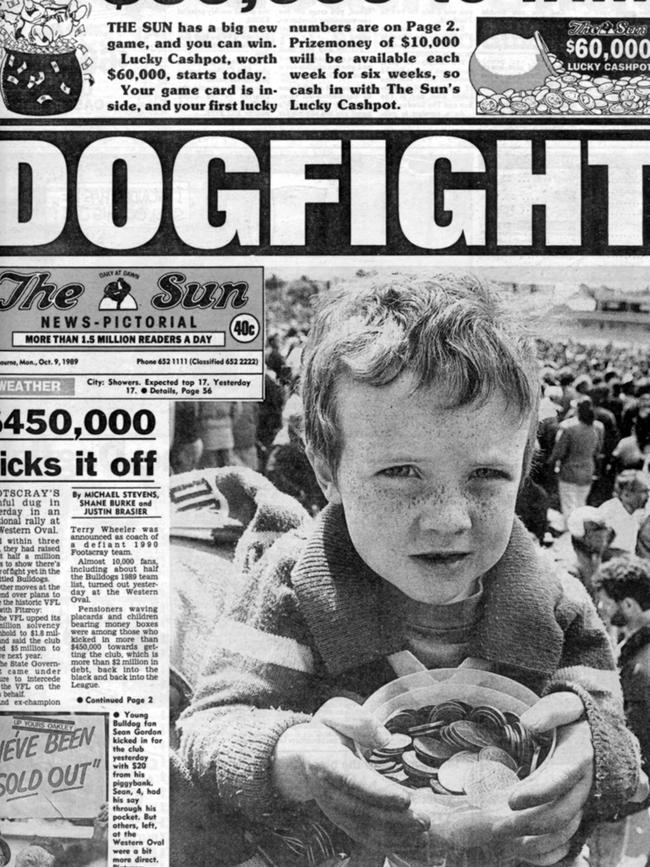
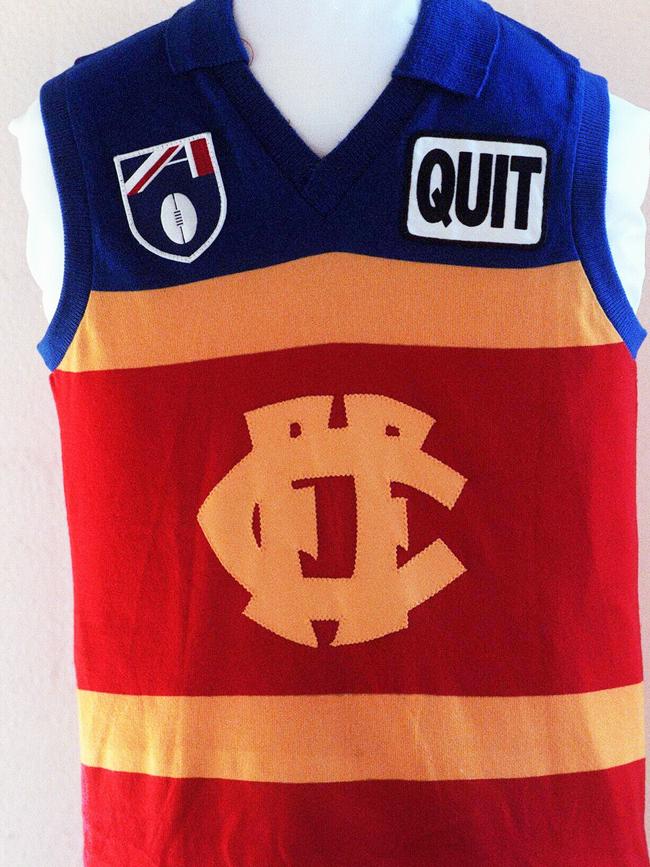
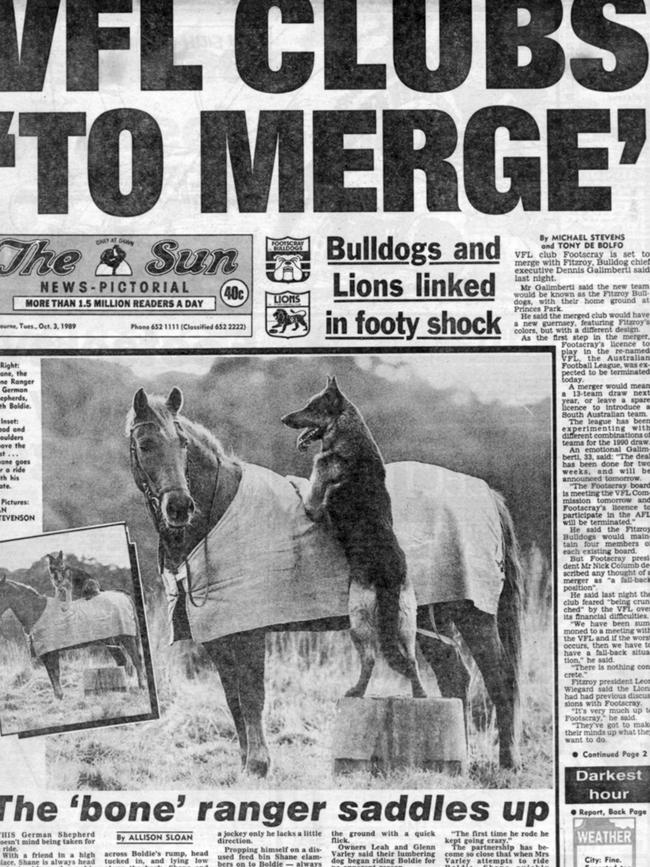
Roos knocked back countless offers to leave, even when Fitzroy tried to sell him to Collingwood in 1991.
“My intent was always to stay,” he said. “I loved the club, I loved the people. The fans were unbelievable.”
“(Then) I got a phone call (in 1991) as captain of the club and they (Fitzroy) said: ‘We need you to take a 30 per cent pay cut or we’re going to trade you. And by the way, we’ve already spoken to Collingwood (about a trade).
“I was like ‘Wow, I’m the captain of the footy club’. That really rocked me. Even after that, I went back to the club and signed a new contract. But the club wasn’t the same.”
Most of his great mates, including Pert, Alastair Lynch, Paul Broderick, Michael Gale, Richard Osborne and John Blakey, left.
The final straw came when a well-connected Fitzroy supporter called him to say things were going to change.
“I’d heard a fair bit of that before, but I gave him a chance,” Roos said. “We met in a cafe in Mitcham. I said to him: ‘I will hear you out, but I’ll give you two tasks’.
Roos had been presented with a “fake” best and fairest medal on stage and he wanted a real replacement. He also wanted his last payment from the club, which was due in December.
A week after the meeting, the person rang him to say he couldn’t get him his medal, and he needed more time on the payment.
Roos knew he had to make a fresh start.
MEETING PLUGGER
Roos’ first choice in finding a new home was Adelaide, but no one from the Crows would go to Fitzroy, so Sydney won the battle.
It brought him in contact with Tony Lockett, who was leaving St Kilda at the time to join the Swans.
“The Tony (Lockett) deal was done right before the trade deadline,” he said.
“I don’t know whether it was a two o’clock (trade) deadline … but at 1.59pm and 59 seconds it was … Tony Lockett (to Sydney),
“Ron Joseph was on the phone at 2.01 to me and he said: ‘Look mate, we can get you in the March draft’. I said: ‘No worries, I’m going overseas’.”
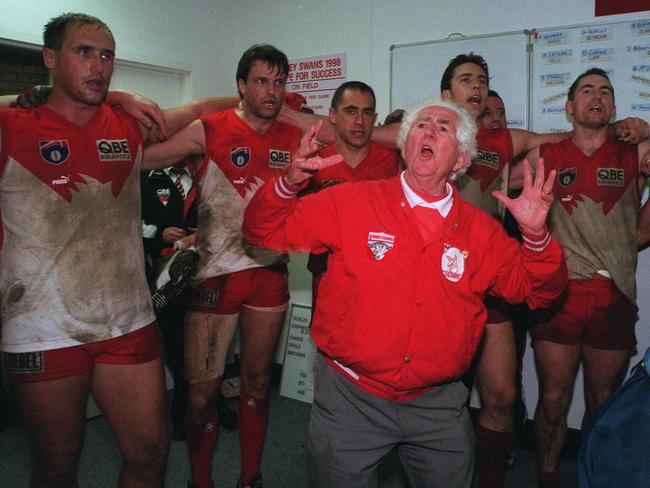
Two seasons into Lockett and Roos’ move to Sydney, the Swans made the 1996 grand final.
“When I signed with Sydney for three years, I thought ‘Look, if we can get to play finals (in that time), that’d be amazing’,” he said.
“But we played some incredible footy. We gave it our best, but North (Melbourne) were just a better team (in the grand final).”
Roos played his 356th — and last game — in the 1998 semi-final against Adelaide, but knew it was time to retire.
“Rodney Eade had this theme … ‘you’ve gotta get on the train’,” he said. “I started on the bench and it was sort of halftime and he (Eade) was like ‘You gotta get on the train’.
“I said to Stewie (Maxfield) ‘Mate, I can’t even get a ticket’.”
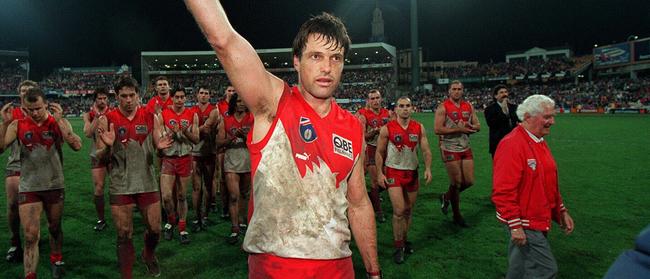
Roos promo 2
‘ROCKET OUT THE DOOR’
Roos was an assistant coach to Eade when things turned messy for the club in 2002, with the round 12 loss to Geelong a sixth defeat in succession.
“I reckon we were three goals up with five minutes to go and I thought ‘Rocket’s going to get another week, at least,” Roos said.
“How wrong could I be? They kicked the few goals and we ended up getting rolled.
I always say this ‘if you, as a senior coach, get beaten to the change rooms by the chairman and the board, grab your keys, go and grab your bag and get the hell out of there because you are done’.
“We get to the rooms and Richard (Colless) is there, and Col Seery (footy boss) and Kelvin Templeton (CEO). The players had the bye next week … and Kelvin, for memory, wanted us to play a full scale practice match.
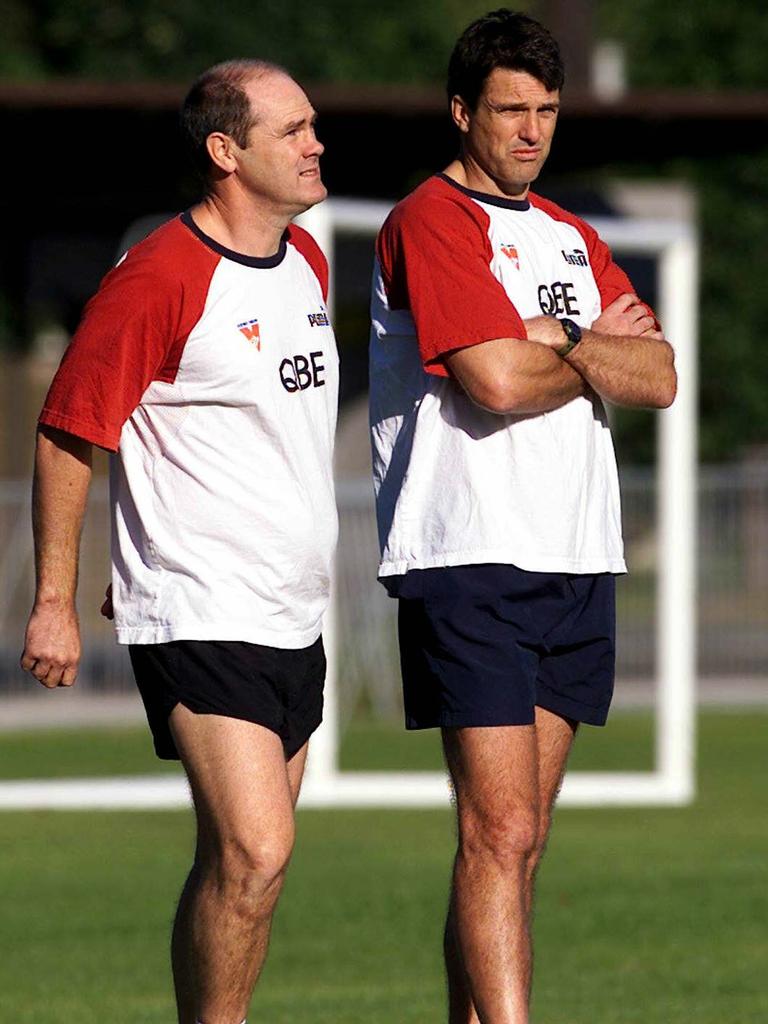
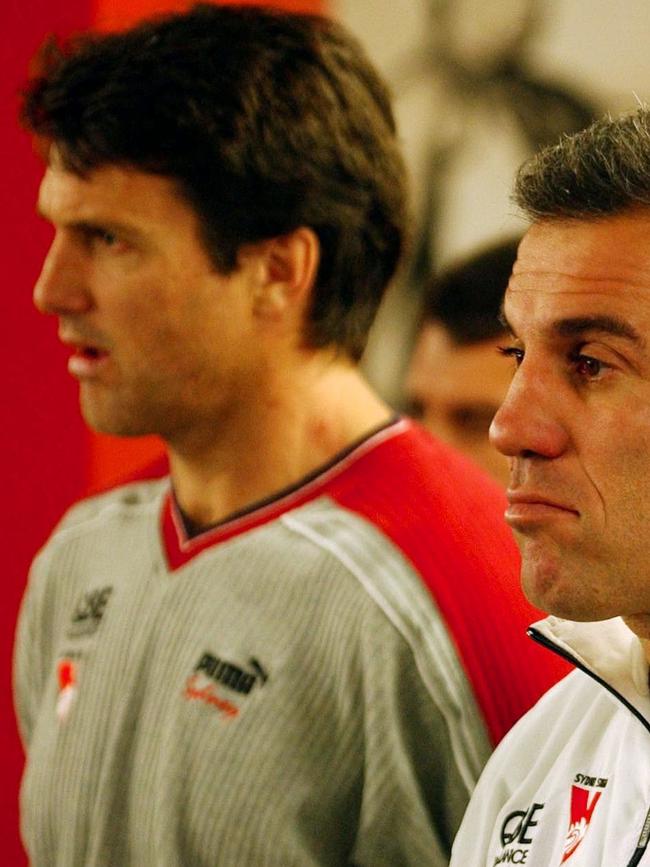
“Rocket didn’t want to do that, so he called a training session the next morning. There was a function upstairs and the boys were like ‘we’re not turning up’. I said ‘Guys, you have to turn up’. They turn up and Rocket does the ‘Scarecrow’ (drill) … You have to put your arms out parallel and hold them there for as long as you can.
“As soon as he did the ‘Scarecrow’, I was like ‘he’s done’.
On the following Monday Roos was in his office, next door to the senior coach’s office, when Channel 10’s Stephen Quartermain called him to ask about Eade’s departure.
Then Roos’ former teammate John Blakey called about the same thing.
“Rocket’s was deadset five metres away, so I went into his office and said: ‘Mate, I’ve just had two phone calls, are you giving it away?’”
“At one stage there was a discussion around myself, Steve Malaxos and John Longmire sharing the (caretaker) role. In the end, I agreed to do it for the rest of the year. It was probably the first time I’d ever thought: ‘Do I really want to coach an AFL team?’
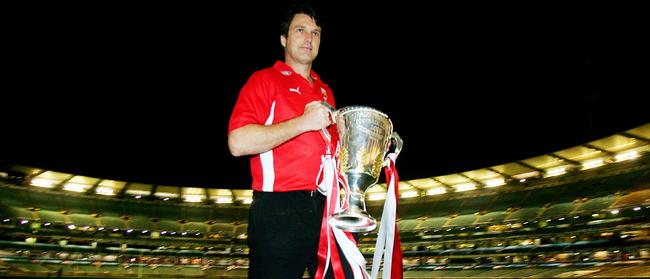
Roos promo 3
GIVING IN TO THE DEMONS
Roos never expected to coach again at AFL level when he organised a handover to John Longmire at the end of 2010.
He was content working in the media and doing some work as part of Sydney’s academy.
Then two things happened.
One was strong interest from Melbourne to come in and assist what had become a mess. The other was a pay cut from the Swans.
“(Swans CEO) Andrew Ireland called me in and said: ‘Roosy, we can’t pay you anywhere near as much anymore’. It was like a 50 or 60 per cent pay cut.
“Then (Melbourne CEO) Peter Jackson started calling me and I met with Melbourne’s leadership group. It was my son, Dylan, who goes to me: ‘Dad, you have to go and coach them. They deserve more than what they’ve had’.”
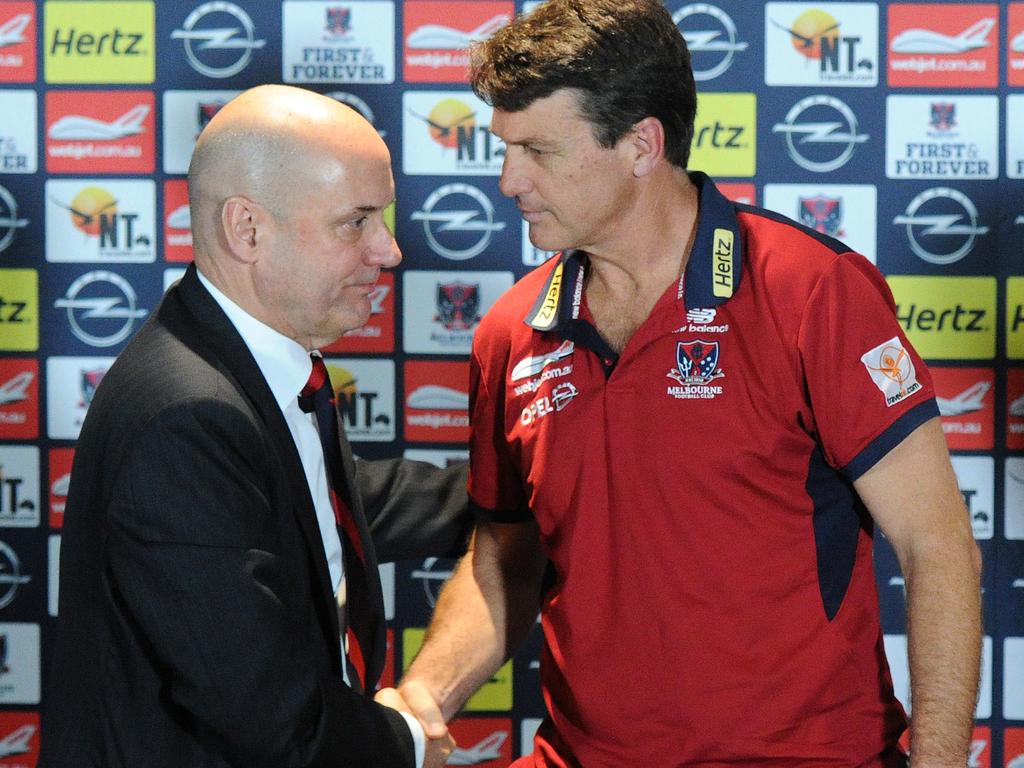
It led to a three-season stint with the Demons (2014-2016), where he walked into “a wounded club”.
He stands by some of the decisions the club made at the time, including a decision to trade out the club’s pick two (which the Giants used on Josh Kelly) for Dom Tyson and a draft pick that ended up being Christian Salem.
“I think out of Kelly and Salem, there’s only one premiership player out of the two of them,” Roos said.
I am a massive Kelly fan. But on our (recruiting list), it was (Jack) Billings before Kelly.
He’s proud that he was there when the Demons set about recruiting so many members of what proved to be the 2021 premiership side.
“Sitting there in lockdown in South Melbourne, I was so proud of the footy club (winning that 2021 grand final in Perth),” he said. “I sent text messages to them all … to Angus (Brayshaw) and Christian (Petracca) and Max (Gawn) and (coach) Simon Goodwin.”
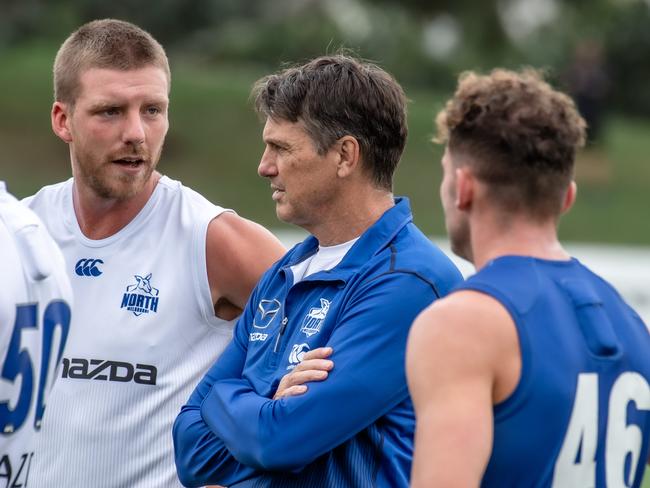
CHOOSING THE ROOS’ COACH
Roos was on North Melbourne’s coaching panel when the club looked to make a long-term appointment at the end of 2020.
David Noble won the job, which he held for only 38 games.
“We rang around so many coaches and ended up with three candidates — David Noble, Robert Harvey and Daniel Giansiracusa,” Roos said.
“We thought that he (Noble) was a really good fit. He had a good pedigree and the club probably needed more of a figurehead rather than a technical coach.
“But I was only involved in the football department for 12 months. Ben Amarfio (then CEO) came to me and said ‘David doesn’t want you to be involved anymore’. He thought, as a part-time person, (I) was not there often enough, which was fair enough.”

Add your comment to this story
To join the conversation, please log in. Don't have an account? Register
Join the conversation, you are commenting as Logout
Gutted ex-Eagles boss calls for change after Hunter death
Former Eagles boss Dalton Gooding has revealed he pushed for a club-controlled funding program for former stars during his time at West Coast, in the wake of the tragic death of Adam Hunter.
AFL flags pre-season changes to help end concussion epidemic
Pre-season has long been considered a danger period for concussions in the AFL, and changes could soon be coming at your club every summer.